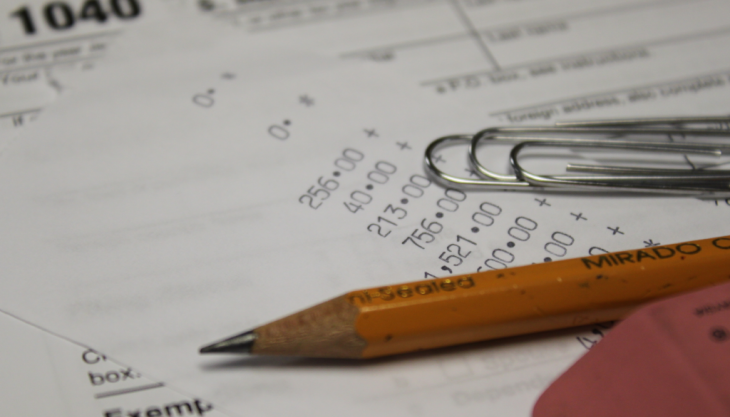Which Debts Does Bankruptcy Not Clear and What Can You Do About Them?
Submitted by Rachel R on Tue, 08/02/2016 - 9:56am

Not all debts can be wiped out in bankruptcy
Image Source: ptmoney.com / Flickr user Philip Taylor
One of the most common questions we hear at the Law Offices of John T. Orcutt is “which debts will NOT go away after my bankruptcy?” It is very important to know which debts will and will not be discharged – and what you can do about those that survive your North Carolina bankruptcy petition. Here’s a rundown of the debts that won’t be discharged and what you can do about them.
#1 Student Loans
Student loans can occasionally be discharged in bankruptcy, but only for those in dire circumstances. If you’re elderly and on a fixed income, it's possible they may be dismissed. If you’re permanently disabled or have a chronic or fatal illness that prevents you from working, they may also be dischargeable.
But if you’re healthy and employable, it’s not likely they can be discharged unless the school closed or was unaccredited when you graduated. Often, the best alternative option is to pursue Income Based Repayment, which may allow you to drop your loan payments to 10% of your disposable income.
#2 Back Taxes
Sometimes back taxes can be eradicated in North Carolina bankruptcy. State and federal taxes that you owe from a return you filed more than two years prior to your bankruptcy – and that you filed on time – can sometimes be wrapped up in your bankruptcy and extinguished.
But for newer tax debts, taxes from years where you never filed a return, or other complex tax issues, bankruptcy may not be able to help. In this case, we can refer you to a skilled tax attorney to assist you in working out a settlement or payment arrangement with the IRS.
#3 Alimony and Child Support
Alimony, child support and other court-ordered payments related to family law matters are not generally dischargeable in bankruptcy. These payments and judgments also cannot be lowered in bankruptcy court. These are family law issues which are mandated by county courts instead.
If you truly can’t afford your alimony or child support payments, you’ll have to go back to family court to request an adjustment. However, filing bankruptcy can unload other debts so that you may have more breathing room in your budget to afford these court-ordered payments.
#4 Court and Criminal Fines
If you owe money to or through the courts, this may or may not be dischargeable in bankruptcy. Civil court judgments (aside from family court matters, see above), are sometimes eligible for discharge. However, DUI fines and fees, as well as criminal restitution, are not dischargeable.
If you were sued by a creditor and they won a judgment, it may be possible to wipe out the underlying debt and judgment. If the creditor won a judgment and then pursued a lien, that complicates things, but it may still be able to be addressed by your bankruptcy. Your bankruptcy attorney can help you figure out.
#5 Debts Obtained through Fraud
Some debts that ordinarily would be discharged in bankruptcy (like credit cards) may result in an objection from the creditor if they believe you were intentionally incurring debt while planning to file bankruptcy.
If you buy luxury goods in excess of $650 within 90 days of filing, you may be open to fraud accusations. Also, if you take out significant cash advances on your credit cards within 70 days of filing your bankruptcy, these debts may be excluded from the bankruptcy.
Find out More about North Carolina Bankruptcy
Most bankruptcy filers can receive significant debt relief through bankruptcy. While it’s true that not all debts can be eradicated in North Carolina bankruptcy, wiping out those debts that can be discharged makes it much easier to afford the non-dischargeable debt.
If you’re struggling with debt, living paycheck to paycheck, and owe far more than you can afford to pay, contact the Law Offices of John T. Orcutt for a no-obligation North Carolina bankruptcy consultation. Call +1-833-627-0115 for a free appointment at one of our locations inRaleigh, Durham, Fayetteville, Wilson, Greensboro or Wilmington to discuss your debt.
Debts Hurt! Got debt? Need help? Get started below!
Serving All of North Carolina
- Bankruptcy Attorneys Raleigh NC (North)
- Bankruptcy Attorney Fayetteville NC
- Bankruptcy Attorney Durham NC
- Bankruptcy Attorneys Wilson NC
- Bankruptcy Attorneys Greensboro NC
- Bankruptcy Attorneys Southport NC
- Bankruptcy Attorneys Wilmington NC
Bankruptcy Attorneys Raleigh NC (North)
6616 Six Forks Rd #203 Raleigh, NC 27615 North Carolina
Tel: (919) 847-9750

Bankruptcy Attorney Fayetteville NC
2711 Breezewood Ave Fayetteville, NC 28303 North Carolina
Tel: (910) 323-2972

Bankruptcy Attorney Durham NC
1738 Hillandale Rd Suite D Durham, NC 27705 North Carolina
Tel: (919) 286-1695


Bankruptcy Attorneys Greensboro NC
2100 W Cornwallis Dr. STE O Greensboro, NC 27408 North Carolina
Tel: (336) 542-5993

Bankruptcy Attorneys Southport NC
116 N Howe St. Suite A, Southport, NC 28461 North Carolina
Tel: (910) 218-8682

Bankruptcy Attorneys Wilmington NC
116 N. Howe Street, Suite A Southport, NC 28461 North Carolina
Tel: (910) 447-2987
